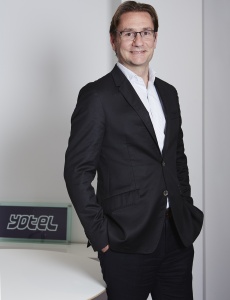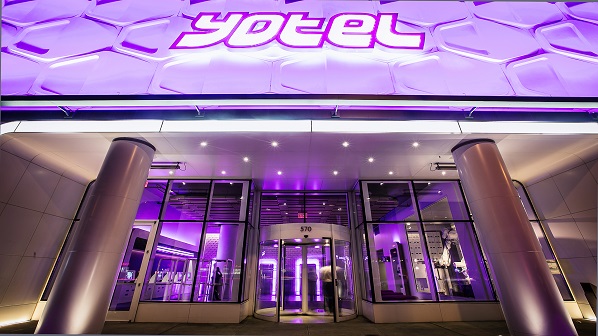Breaking Travel News interview: Hubert Viriot, chief executive, Yotel
 Hubert Viriot, chief executive, Yotel speaks to Breaking Travel News
Hubert Viriot, chief executive, Yotel speaks to Breaking Travel News Inspired by first class travel, Yotel translates the language of luxury airline travel into small but luxurious ‘cabins’.
These include a signature adjustable ‘SmartBed’ with luxury bedding, rejuvenating monsoon rain showers, relaxing mood lighting and a ‘techno wall’ with smart TVs, multi power points and easy connectivity.
Here Breaking Travel News editor Chris O’Toole sits down with chief executive Hubert Viriot to find out more about this small company with global aspirations.
Breaking Travel News: You are looking forward to the opening of your latest property, in Paris, in just a few weeks? Could you tell us a little about that?
Hubert Viriot: We have just stated taking bookings at our next property at Charles de Gaulle Airport in Paris. This will be our fourth airport hotel, and the first we have opened since 2011.
It is also the first of many to come in the next few years.
It is located directly within Terminal 2E, the second airside property we have launched, following Amsterdam Airport Schiphol.
We are reasonably familiar with operating within this unique environment.
Obviously 100 per cent of the guests are airline passengers, those transferring through the airport, which is the second busiest in Europe.
BTN: Do you have a relationship with any of the airlines there, to ensure guests are aware of the service you offer at the airport?
HV: Each airport functions very differently, so you cannot have a global agreement with airlines.
At Charles de Gaulle we are situated in Terminal 2E, which is the hub for SkyTeam and Air France-KLM, and Delta Air Lines.
We work with these carriers and have very good relationships with them.
BTN: What has caused the delay between openings; you mentioned this is the first since 2011?
HV: Our company has changed quite significantly in this time. We have had a change of shareholders, ownership and management.
We also focused on the opening of the New York property. This hotel has over 700 rooms, whereas previously we had operated hotels with 50, 60 rooms.
This put a great deal of pressure on this organisation and a lot of focus went on ensuring we delivered the flag-ship property correctly.
It was very important for us to get that hotel right.
We now run at 93 per cent occupancy, which is great for a new brand opening in Manhattan.
We were also at the back-end of the global financial crisis, which again slowed us down.
But the plan was always to open in New York and then grow in the United States from there.

BTN: Has this come to fruition? Where are you growing now?
HV: We have a second hotel coming in New York, in Williamsburg, Brooklyn, and then we have a hotel coming up in Boston, in the Seaport, and then in Market Street in San Francisco and in Miami.
We are also actively looking for more and hope to announce more deals by the end of the year.
But it is not just the US.
We are based here in the UK, but have global aspirations.
We believe the Yotel product is not just a US-focused product, or even an airport-focused product, moving from airport hotels to city hotels.
Both our city and airport products hold tremendous appeal for the smart, modern traveller. Mainly into big, hub cities around the world; Singapore, Paris, San Francisco and others.
Outside of the US we are looking at seven other hotels currently.
These include two more in Singapore, Dubai, and others.
We hope to follow a similar strategy here – open a flagship hotel in the key markets and then expand from there.
This allows us to have a full team in place, senior management. These are tasked with not only running the hotel, but building the brand in that region.
BTN: Can you tell me a little about the structure of the company? How is Yotel organised?
HV: We are an asset light company, we don’t own the assets or real estate, but manage them.
Our major shareholder, now, is IFA Hotels & Resorts. They have, however, invested into New York, and they, IFA, own that real estate.
All the others hotels we have are owned by third parties, ranging from private equity funds in the United States, family companies in Europe and then joint ventures, for example with Changi Airport, in Asia.
One of the things we are most proud of is the quality of our owners; they have bought into the vision of Yotel, our capabilities and what we offer for the future.
These are sophisticated, established investors who have selected us ahead of more mainstream brands.
BTN: Could you tell me a little about the product more generally, what is it you offer to the hospitality space?
HV: The inspiration came from the airline space. It seems obvious now, but nobody had done it before.
The experience you have with premium seats in aircraft is very positive.
Our idea was to do that on the ground, to offer convenience, but also to offer a qualitative, luxury experience.
Yes it is convenient and well-priced, but that is because we have removed a great deal of the perks and left only what is needed.
For us, the star rating is passé, so we have sought to move beyond that.
We have taken some of the luxurious elements of the three-, four-star hotels, but also some of the one-star ideas.
Room size for example. Room size is the last thing that matters to our guests; what matters is the facilities on offer and the quality. Just as it does with an airline seat.
Our rooms are 16 square metres, and all are designed by airline cabin designers. They took the elements of what makes those cabins successful. Every inch is thought about, planned.
But we also have high bandwidth internet, Bluetooth, numerous charge points for devices, and a smart television – all of this is vital to the guest experience.
We also seek to make the entire booking process simple. We are aiming for a few clicks and you are done, following in the footsteps of Uber and others.
Our website is very smartphone friendly, very easy to use, as is our new app. This is the main place to reserve and control a booking.
The app, too, is the centre of your visit. Not only can you have the key to your room on your phone, but it is also our concierge, with links to all the latest events, dining options in the city and everything else you might need.
The aim is an easy, smooth stay. We aim to give our guests back their time.
BTN: How has this product been received among travellers?
HV: Very well. We assumed it would mainly be for Millennials, but they are only 40 per cent of our market.
We get Boomers, Generation Y, and seniors, all sectors of the market.
A lot of people use the application and check-in online.
We do have what we call Mission Control, where our staff are available can help with everything like a more traditional hotel.
But things like checking in, checking out and paying the bill are rarely an exciting experience, so we have tried to make that as easy as possible.

BTN: How about on the social side? The idea of cabins gives the impression guests might be a little isolated?
HV: We are very proud of our Club Lounge.
We do not operate traditional restaurants. The lounge is more a multi-functional space, offering refreshment, but also business facilities.
It is open 24-hours a day, with staff during the day.
Guests can work here; we have private spaces, co-working tables, screens for presentations, and a telephone booth without a telephone, where you can make calls in private.
This is a place to hang-out, relax.
The design is location-specific, we let our designers run wild, but the idea is the same in each of our properties.
Our customers are mainly independent travellers and this is the place they can meet.
BTN: Who do you view as your competitors in this space?
HV: Generally speaking the hotel industry is changing a lot.
All the star ratings are getting mixed up, but we are focusing on the spectrum between two and four star.
We are looking to revolutionise this idea, but we are not the only ones.
We were a pioneer, but there are others.
On the airport side, very few people do what we do. At a local level, individual properties offer something similar, but there is nobody with global aspirations, a brand.
We want to be in every single hub airport in the world.
On the city side, this is a growing segment, and it is fair to call it a segment now.
There are self-groomed brands, such as CitizenM and Mama Shelter, or at the higher end, brands like Ace, or Tommie in the US.
But then the major brands are also trying to work out what we are doing.
Marriott has launched Moxy, Accor has bought into Mama Shelter, and Hilton has launched Canopy.
Everybody is trying their own thing. For me this is comforting, the sector is growing and there is plenty of space.
The guys who need to be worried are the more traditional budget hotel brands. Are they losing their unique selling points?
In New York – with 700 rooms - we are competing against the Meridian next door; we are aiming for the big clients, as they are.
Yet, there are no cities where all these brands are present, so there is still plenty of room for this sector to grow – we are not yet competing head-to-head.
BTN: How about pricing? Is it correct you can take the rooms for a matter of hours?
HV: The pricing is different for the city and airport hotels.
In the airport hotels we are targeted at the passengers. They know exactly what they need, arriving at a time, and leaving at a time.
They book before they take off and get full flexibility.
They can book with us, at least four hours, and take just what they need.
The average stay is six hours, for which we charge around £60, and this gives us occupancy of up to 300 per cent, selling the room three times a day.
In the city hotels we charge £150 a night, in New York for example. And this is for the night.
The product is built around a nightly stay, at present, but we are optimistic the airport model could move into the city – in railway stations, or in shopping centres.
This is what we hope for the future.
Chris O’Toole

